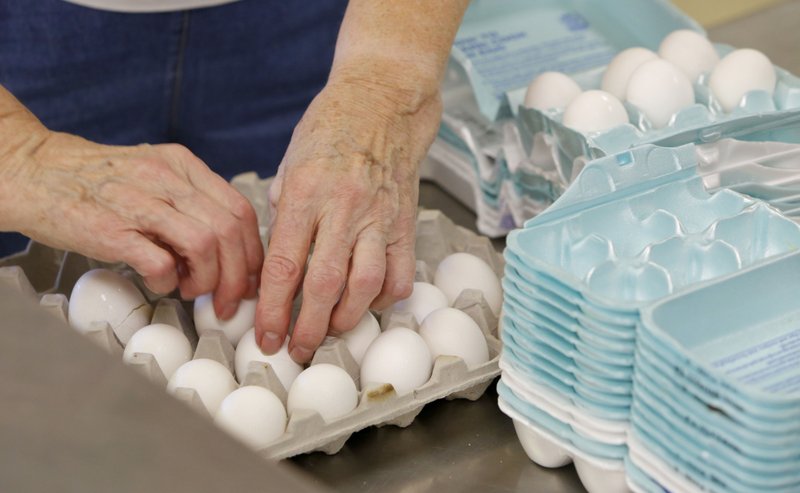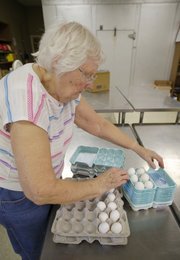Denise Hill was a stay-at-home mom with three young children. Her husband was the only one working, and sometimes the family just couldn't make ends meet.
Hill found help at food pantries in the Fayetteville area.
Healthy donations
for food pantries
Fresh produce
Canned protein (chicken, tuna)
Brown rice
Oats and oatmeal
Quinoa
Lentils
Dried beans
Whole wheat pasta
Dried fruits
Almond, peanut, sunflower butters
Nuts and seeds
Protein bars
Low-sugar granola bars
Jerky
Canned fruits and vegetables (low in sugar and sodium)
Cookbooks
Feed Communities also has developed two cookbooks to help families provide healthy meals with items they might have received from food pantries — Healthy Recipes from the Pantry: A Healthy Recipe Guide for your Food Pantry and Healthy Recipes from the Garden.
For example, someone might receive a basket full of radishes and not know what to do with them, said Kayla Mayes, program director for Feed Communities in Faytteville. The garden book will describe the vegetable, list its health benefits and explain “what part to eat and what part to cut off,” she said.
The book also include recipes for the produce and pantry items that can be prepared in a microwave.
Feed Communities partner pantries have copies of the cookbooks. Copies of the books are available from the organization for the cost of the printing.
But both books are available for free printing from the Feed Communities website.
"As a parent, you feel like a failure when you can't feed your kids. You're working and doing everything you need to do, and you still can't feed your kids. It's hard to humble yourself when you need help, but there shouldn't be a hungry child."
The basics Hill got from food pantries usually included "a bag of pasta, canned things that you don't really like lima beans, cranberry sauce, pumpkin," she said. "Maybe you'd get some chicken thighs. But you'd get a box of stuffing, boxed macaroni and cheese, beans, sometimes some rice."
Missing from this list were several of the components required to feed her family a balanced diet. "The beans and the rice were OK, but there was nothing to go with them. There were lots of carbs and sugar, but never any lean meat."
Fruits and vegetables also were missing -- unless they came canned and packed with sugar. "It would have been nice to get a bag of apples," she said.
Even when money was available for a trip to the grocery store, tough choices had to be made. Hill would stock up on 70-percent lean hamburger meat when it was on sale for 88 cents a pound, she said. Then she'd try to stretch each pound to make a meal.
"We ate a lot of Hamburger Helper -- as horrible as that is," she said. "I will not eat it today.
"Sometimes, I would buy a bag of apples and feel good about that," she continued. "But when they were gone you realized you could buy three boxes of cupcakes for the same price at the dollar store."
READ LABELS
One in five Arkansans live with food insecurity such as Hill remembers, according to Feed Communities in Fayetteville. The local nonprofit agency was founded with the vision of "durable solutions for food security," reads the organization's website.
The organization operates several programs designed to get healthier food items into local pantries. The nonprofit partners with five local food pantries to help them provide the healthiest food possible for their clients, which the agency estimates number 5,000 people each month.
"We need to promote a healthy lifestyle in a population that is super-vulnerable, those who are food insecure," said Billy Rader, chief executive officer at Seven Hills Homeless Center in Fayetteville. "Poor health can lead to increased visits to hospitals, which leads to an increased burden on the population.
"We try to promote wellness, but wellness takes a back seat and is well down on the list when a person's first priority is trying to survive the system."
One hurdle pantries face in providing fresh food is the lack of cold storage, said Kayla Mayes, program director for Feed Communities. Her job is to oversee all programming aimed at increasing food access in Northwest Arkansas.
That means the food offered must be nonperishable items that can go from the shelf to the table, she explained. But healthy, easy substitutions are available in grocery stores for those who feel called to donate to food pantries. The organization has developed a list of healthy food items that is provided with this story.
"Look at nutrition labels [of canned foods,]" Mayes suggested. "Look for vegetables that are very low in sodium, and canned fruits that are 'light' or packed in water rather than sugar."
Instead of the cheap staple of Ramen noodles, whole-wheat pasta could be substituted, she said.
"If you want to donate holiday food items, think protein," she said. "Canned chicken or tuna or protein-heavy soups."
"Don't give the things you no longer want in your pantry," Hill urged. "Give what you'd like to have for a meal yourself. Donate a bag of apples, a bag of oranges."
FRESH PRODUCE
Another program of Feed Communities works to put fresh fruits and vegetables in the hands of the food insecure. "Through 'Plant a Row,' the organization asks farmers and home gardeners to plant an extra row of produce, with the yield going to partner food banks," Mayes said.
For those pantries that don't have storage, gardeners are encouraged to take the produce on the day the pantry is open, so it can be disbursed immediately, Mayes said.
"We leave it up to the pantries as to how they distribute it," she said. "They know their clients. They know who has a house and can cook. Some just put it out on a table for whoever wants it."
For example, Seven Hills Homeless Center in Fayetteville receives items that can be eaten raw.
The Plant a Row program has spurred a community garden, which the clients tend at the Seven Hills Day Center, Rader said. Fresh produce is served alongside the daily meals provided by the center.
Clients love the fresh produce, said Sabrina Thiede, director of mission and outreach at First United Methodist Church in Springdale, which operates the Bread of Life pantry, a partner with Feed Communities. "When they go to the pantry, they have no choice [in what they get]. We set up a little farmers' market. Then, they can get two tomatoes instead of one cucumber they won't eat."
Many of Bread of Life's clients are seniors who grew up on fresh produce, Thiede continued. But today, they're living on food stamps, receiving about $16 a month for food. "Well, that buys the meat they need for a month, but nothing else. But they're grateful for that amount they do receive," she was quick to add.
Hill, however, noted the fresh produce might be gone by the time she got to the pantry that day. She wishes the food banks could offer vouchers for clients to buy $20 or $30 worth of fruit and vegetables from a local store.
NEW YEAR
The people of Northwest Arkansas regularly open their hearts to help those in need. One count puts the number of food pantries in the Northwest Arkansas area at 92, but many churches operate pantries which probably fly under the radar.
"We've been blown away by the generosity," Mayes said of the Plant a Row program. The agency collected 3,000 pounds of fresh produce this summer, including farm-fresh eggs.
Pantries large and small have been requesting donations for Thanksgiving food baskets for nearly a month, but Mayes also suggested similar healthy donations to food pantries year round.
Food pantries see increased traffic when school is not in session, so parents must provide meals at home -- times like summer, "and especially right after Christmas when everybody has just donated for the holidays," she said.
"Even though the situation is not ideal, I was really thankful for the food we received," Hill said. "I'm thankful that people were there to help.
"And I hope people this year will be even more giving than ever."
NAN Our Town on 11/10/2016



